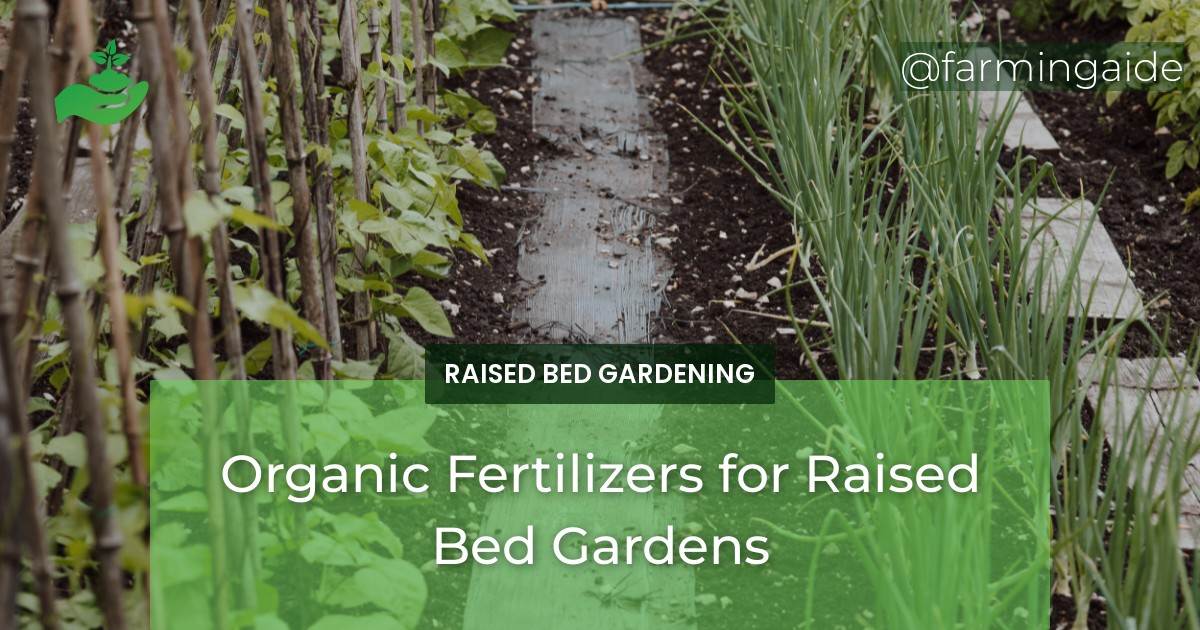Using organic fertilizers is one of the best ways to improve the growth of your plants in raised bed gardens. Organic fertilizers are made from natural materials that contain essential plant nutrients, which enrich the soil and promote healthy plant growth. In this article, we’ll discuss the benefits of using organic fertilizers, the types that are suitable for raised beds, proper application techniques, and tips for using them.
Table of Contents
Benefits of Organic Fertilizers
Organic fertilizers provide numerous benefits that are advantageous for raised bed gardens:
Rich in Nutrients
Organic fertilizers contain essential plant nutrients like nitrogen, phosphorus, and potassium. These nutrients are essential for healthy plant growth and development.
Improves Soil Structure
Organic fertilizers help in improving soil structure. They contain organic matter that improves soil texture, making it looser and more porous. This porous soil structure allows better water and air movement, which promotes healthier root development and plant growth.
Environmentally Friendly
Organic fertilizers are environmentally friendly and safe for humans and pets. They are made from natural materials, are biodegradable, and do not contain harsh chemicals that can harm the environment.
Promotes Healthy Plant Growth
Organic fertilizers promote healthy plant growth by providing essential plant nutrients. They also contain beneficial microorganisms that improve soil health and stimulate plant growth.
Types of Organic Fertilizers Suitable for Raised Beds
There are several types of organic fertilizers that are suitable for raised beds:
Compost
Compost is a natural fertilizer that is made from decomposed organic matter such as kitchen scraps, leaves, and grass clippings. It is rich in nutrients and beneficial microorganisms and can be mixed with soil before planting or used as a top dressing during the growing season.
Manure
Manure is an excellent source of organic matter and essential nutrients like nitrogen, phosphorus, and potassium. It can be used as a top dressing or mixed with soil before planting. However, it is essential to ensure that the manure is well-aged and free of harmful bacteria that can cause plant diseases.
Fish Emulsion
Fish emulsion is a liquid fertilizer made from fish waste. It is high in nitrogen and is an excellent choice for fast-growing plants like tomatoes and peppers. It can be used as a foliar spray or mixed with water and used to water plants.
Bone Meal
Bone meal is a natural fertilizer that is made from crushed animal bones. It is rich in phosphorus, which is essential for strong root development and flower formation. It can be mixed with soil before planting or used as a top dressing during the growing season.
Blood Meal
Blood meal is a natural fertilizer that is made from dried animal blood. It is high in nitrogen and is an excellent choice for leafy vegetables like spinach and lettuce. It can be mixed with soil before planting or used as a top dressing during the growing season.
Worm Castings
Worm castings are a natural fertilizer that is made from worm waste. They are rich in nutrients and beneficial microorganisms and can be used as a top dressing or mixed with soil before planting.
ALSO READ
Proper Application Techniques
Proper application techniques are essential for the effective use of organic fertilizers in raised bed gardens. Here are some techniques to consider:
Mixing with Soil Before Planting
For best results, mix organic fertilizers with soil before planting. This helps to ensure that the nutrients are available to the plants when they need them.
Top-Dressing During Growing Season
Top-dressing with organic fertilizers during the growing season can help to provide a continued supply of nutrients to the plants. This is particularly important for long-season crops like tomatoes and peppers.
Watering in the Fertilizer
Watering in the fertilizer after application helps to ensure that it is distributed evenly throughout the soil. This helps to prevent nutrient burn and ensures that the plants receive the nutrients they need.
Using in Combination with Synthetic Fertilizers (Optional)
Organic fertilizers can be used in combination with synthetic fertilizers for optimal results. However, it is essential to use them in moderation to prevent over-fertilization.
Tips for Using Organic Fertilizers in Raised Bed Gardens
Here are some tips to keep in mind when using organic fertilizers in raised bed gardens:
Test Soil Regularly
Regular soil testing is essential to determine the nutrient levels in the soil and to ensure that the correct amount of fertilizer is applied.
Use in Moderation
Organic fertilizers can burn plants if applied in excess. Use them in moderation and follow the manufacturer’s instructions.
Rotate Types of Fertilizers
Rotating types of fertilizers can help to ensure that all the essential nutrients are delivered to the plants. It also helps to prevent nutrient depletion and maintain soil health.
Ensure Proper Storage
Proper storage of organic fertilizers is essential to ensure that they remain effective. Store them in a cool, dry place away from sunlight.
Keep Pets and Children Away During Application
Organic fertilizers can be harmful to pets and children if ingested. Keep them away during application and ensure that the fertilizer is watered in thoroughly.
Using organic fertilizers in raised bed gardens is an effective way to promote healthy plant growth and improve soil health. With the right application techniques and tips, you can enjoy a bountiful harvest of healthy, vibrant plants.
RELATED ARTICLES:


